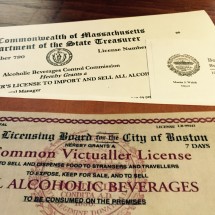Law Offices of John P. Connell, P.C.: Pursuant to their statutory creation, alcoholic beverage licenses in Massachusetts only exist for the calendar year for which they were issued, and then expire on December 31 of that year unless properly renewed. If a liquor license is not properly renewed at the end of a calendar year pursuant to a relatively easy administrative procedure, it will be considered expired and resort back to the municipality that issued it. If not renewed properly, the holder of a license will then have to apply for a new license pursuant to the more strenuous new license application process. As issues can arise in the renewal process that may affect the proper renewal of a license, a license holder should be generally familiar with the law in this regard.
In general, liquor licenses are “automatically” renewed provided the license holder follows the renewal procedure properly. In some instances, however, a timely filed renewal application may still be rejected for “cause” by a local licensing authority. See In Re: Atara LLC, Boston (ABCC Decision dated 10/17/03). “Cause” may involve any conduct which could be the subject of a violation proceeding.
In regard to the timely filed renewal application where “cause” for rejecting the application is not present, there are three important points to know about renewal applications pursuant to G.L. c. 138, §16A: (1) the renewal application must be signed by the holder of the license during the month of November; (2) the renewal application can only be signed by a person properly authorized to sign the application, which includes only the shareholders, directors and/or officers of a corporation, the manager of an LLC, and the manager of record, which have been approved by the local licensing authority; and (3) there are no new shareholders, directors and/or officers (in the case of a corporation), managers and members (in the case of an LLC) or change in managers of the establishment that have not been disclosed and/or approved by the local licensing authority.
In other words, a licensee that renews a license is essentially stating under oath that everyone with a financial interest in the profits of an establishment have been fully disclosed and approved by the local licensing authority. When the local licensing authority or the Massachusetts Alcoholic Beverages Control Commission learns and determines that a renewal application has been signed by an un-authorized individual, or by an authorized individual that has falsely stated there are no new individuals with a financial interest in the license, the penalty is severe and draconian: automatic revocation of the license with, according to the ABCC, no other sanction available for the ABCC to consider. See G.L. c. 138, §64.
In the instance that the individual dies during the year; or a licensee files for bankruptcy protection during the year; or a pledgeholder of a license has undertaken control of the establishment’s license during the year, making it impossible for the actual licensee’s approved signatories to sign the renewal application, state law allows a properly appointed administrator/executor, an appointed trustee in bankruptcy or a pledgeholder, respectively, to sign the renewal application on behalf of the actual licensee so as to not lose the license. In regard to other instances, for example, when a Sheriff has acquired a license through a lawsuit or someone has acquired the right to purchase a license at an auction, the law is not as clear.
Moreover, establishments that have closed down or are out of business have a somewhat murky right to renew a license, as the licensee essentially has to state under oath that the license is still in full force and effect at the approved location. When an establishment has closed, therefore, a local licensing authority may reject the renewal application for “cause.” For example, in the 2012-2013 renewal process, the Town of Swampscott decided to act in its own interest and renewed a license for an establishment that was closed down only as a means for saving the license for the town, since the license otherwise would have been surrendered back to the State. For this reason, if your establishment has closed and the renewal season is imminent, you should consider obtaining legal advice regarding the best way to properly proceed.
Still other issues arise when local licensing authorities impose their own conditions for license renewals. In the City of Boston, the licensing Board made it a requirement in 2012 that the licensee submit a floor plan of its premise with its renewal application or have the application be rejected. In other towns, local licensing authorities considered using the renewal process as leverage to collect unpaid water bills owed by licensed establishments. Since year after year licensees are faced with such a short window of time to renew such an essential element of their business, one can only expect that municipalities will become more aggressive in the future when it comes to renewal requirements.
© Law Offices of John P. Connell, P.C., 2012.

